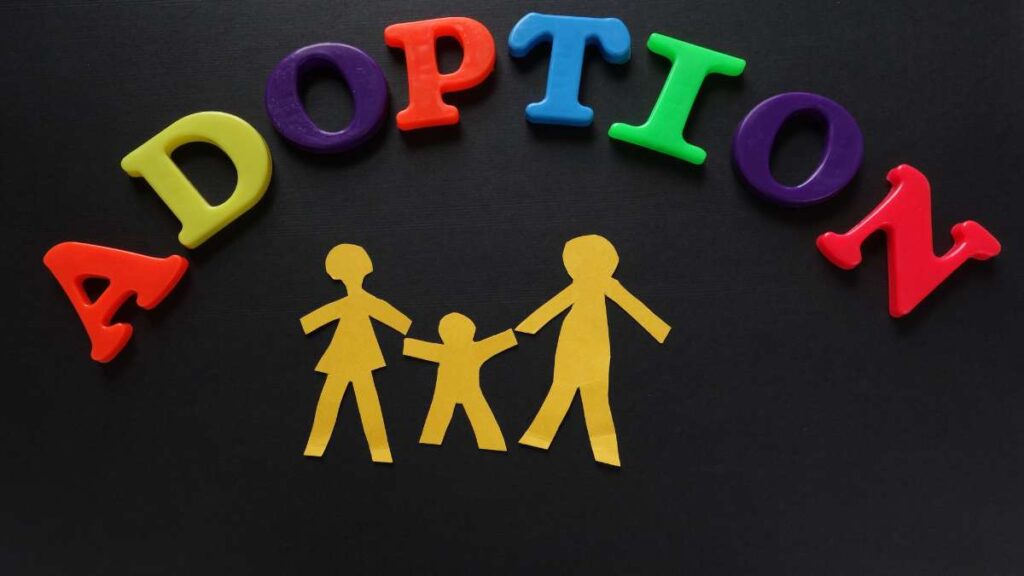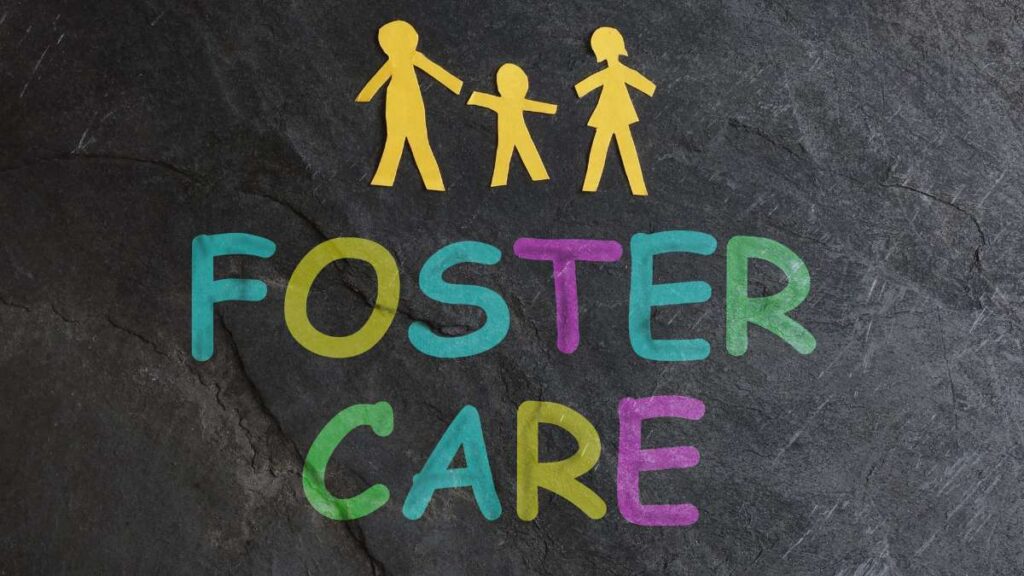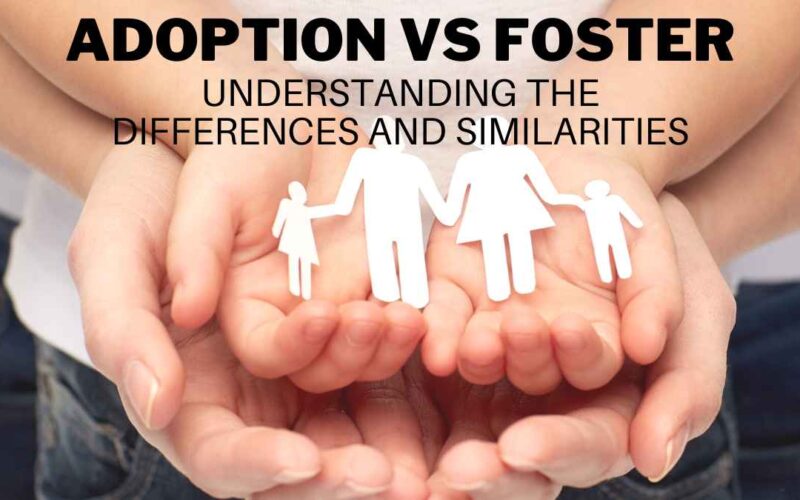Adoption and Foster Care are two of the most well-known ways to provide children with a safe and loving home. However, while both provide care and support to children in need, there are some significant differences between the two. In this blog post, we’ll give you a thorough comparison of Adoption vs Foster.
Adoption
Adoption is a legal process that permanently transfers the parental rights and responsibilities of a child from their birth family to their adoptive family. This means that the adoptive family becomes the child’s legal parent(s), with all the legal rights and responsibilities that come with it. Adoption is typically pursued by people who want to become permanent parents to a child, rather than providing temporary care.

Types of Adoption
There are several types of adoption, each with its own unique characteristics:
- Domestic Adoption: This is when a child is adopted within the same country as the adoptive family. Domestic adoption can either be open, semi-open, or closed, depending on the level of contact between the birth family and the adoptive family.
- International Adoption: This is when a child is adopted from a foreign country. International adoption can be complex and expensive, as it involves navigating different legal systems and cultural differences.
- Foster Care Adoption: This is when a child is adopted from the foster care system. Foster care adoption is often less expensive than other forms of adoption, and it can also provide a loving home to a child who has experienced trauma and loss.
Foster Care
Foster care is a temporary arrangement in which a child is placed with a foster family or caregiver while their birth family works to address the issues that led to the child being removed from their home. Foster care is designed to provide a safe and stable environment for children while their birth family receives the support they need to reunify with their child. In some cases, foster care may also provide a temporary home for children who cannot be reunited with their birth family and are waiting to be adopted.

Types of Foster Care
There are several types of foster care, each with its own unique characteristics:
- Traditional Foster Care: This is the most common type of foster care, in which a child is placed with a foster family or caregiver for a temporary period of time.
- Respite Foster Care: This is a short-term placement that provides a break for the child’s primary foster family or caregiver.
- Kinship Foster Care: This is when a child is placed with a relative or someone who has a significant relationship with the child, such as a family friend.
- Therapeutic Foster Care: This is a specialized type of foster care that provides support to children with complex emotional and behavioral needs.
Similarities between Adoption and Foster Care
| Adoption | Foster Care |
|---|---|
| Both involve providing a safe and stable home for a child in need. | Both involve providing a safe and stable home for a child in need. |
| Both require a thorough screening process for prospective parents. | Both require a thorough screening process for prospective foster parents. |
| Both involve caring for a child who is not biologically related to the caregiver. | Both involve caring for a child who is not biologically related to the caregiver. |
| Both require a commitment to providing for the child’s physical, emotional, and developmental needs. | Both require a commitment to providing for the child’s physical, emotional, and developmental needs. |
| Both require legal proceedings to establish the rights and responsibilities of the caregiver. | Both involve legal proceedings to establish the rights and responsibilities of the foster parents. |
| Both offer the opportunity to provide a permanent home for a child. | Both offer the opportunity to provide a temporary or permanent home for a child. |
| Both require ongoing support and supervision from social workers and other professionals. | Both require ongoing support and supervision from social workers and other professionals. |
| Both may involve contact with the child’s birth family. | Both may involve contact with the child’s birth family. |
| Both require the caregiver to have a significant impact on the child’s life. | Both require the caregiver to have a significant impact on the child’s life. |
It’s important to note that there are also some significant differences between adoption and foster care, such as the legal status of the child and the length of time the caregiver expects to care for the child. However, this table focuses on some of the key similarities between the two processes.

Differences between Adoption and Foster Care
| Adoption | Foster Care |
|---|---|
| Adoption involves permanently adding a child to a family and legally severing ties with the birth family. | Foster care involves temporarily providing care for a child, with the goal of reuniting the child with their birth family or finding a permanent home. |
| Adoptive parents have full legal and parental rights and responsibilities for the child. | Foster parents have limited legal rights and responsibilities for the child, and the child’s birth family retains legal rights. |
| Adoptive parents are often chosen by the birth family or adoption agency, and may have preferences for the child’s age, race, or other characteristics. | Foster parents are matched with children by social workers, and may not have a say in the child’s placement or characteristics. |
| Adoption is a permanent and final decision, and the adoptive parents have no legal obligation to maintain contact with the child’s birth family. | Foster care is intended to be temporary, and the child’s birth family may be involved in their care and decision-making. |
| The adoption process can be lengthy and expensive, involving legal fees, background checks, and home studies. | The foster care process typically involves fewer legal requirements and costs and may provide financial support to the foster parents. |
| Adoptive parents may be required to attend parenting classes or counseling sessions before the adoption is finalized. | Foster parents may be required to attend training sessions and participate in the child’s case planning and reunification efforts. |
| Adoptive parents may have more control over the child’s upbringing, including education, religion, and medical decisions. | Foster parents may have limited control over the child’s upbringing, and decisions may be made by the child’s birth family or social workers. |

It’s important to note that there is a lot of variation within both adoption and foster care, and these differences may not apply in every situation. However, this table highlights some of the key distinctions between the two processes.
It’s worth noting that while there are some clear differences between adoption and foster care, there is also some overlap. For example, both require a significant commitment of time, energy, and resources, and both aim to provide a safe and loving home for children in need. Ultimately, the decision between adoption and foster care will depend on your individual circumstances and goals, as well as the needs of the child.
Which One is Right for You?
Deciding whether to pursue adoption or foster care is a personal decision that depends on your individual circumstances and goals. Some factors to consider include:
- Your motivation: If you are looking to become a permanent parent to a child, adoption may be the best option for you. If you are willing and able to provide temporary care to a child, foster care may be a better fit.
- Your financial situation: Adoption can be expensive, while foster care provides financial support to caregivers. Consider your budget and how much you are willing and able to invest in the process.
- Your lifestyle: Adopting a child requires a significant commitment of time and energy, while foster care may provide more flexibility. Consider your work schedule, living arrangements, and other factors that may impact your ability to care for a child.
- Your support network: Both adoption and foster care require support from friends, family, and professionals. Consider whether you have a strong support network in place or if you need to build one.

Conclusion
In conclusion, adoption and foster care are both important ways to provide children with a safe and loving home. While there are significant differences between the two, they share many similarities, including the commitment to providing the best possible care to children in need. If you are considering adoption or foster care, take the time to research both options and speak with professionals who can help you make an informed decision. Whatever you choose, know that you are making a significant and meaningful contribution to the lives of children in need.
For more parenting tips and advice, you can read more articles on our website. We always come up with thoroughly detailed articles on various topics. Some of them are listed below for your reference:
- Toy Story: Exploring the Importance of Toys for Children
- 10 Advantages of Reading Aloud to Children
- The Impact of Screen Time on Kids’ Development and 5 tips to Balance it
- 5 Common Benefits of Outdoor Play for Kids and How to Encourage It.
- Top 10 Fun Fitness Games for Children
- How to Clip Baby Nails: A Complete Guide
- How to Change a Diaper in 8 Easy Steps.
Frequently Asked Questions
What is the difference between adoption and foster care?
Adoption is a legal process that permanently transfers parental rights from the birth parents to the adoptive parents. Foster care, on the other hand, is a temporary placement for a child while their birth parents work to improve their circumstances or until the child can be placed with a permanent family.
Who is eligible to adopt or become a foster parent?
What is the difference between adoption and foster care?
Adoption is a legal process that permanently transfers parental rights from the birth parents to the adoptive parents. Foster care, on the other hand, is a temporary placement for a child while their birth parents work to improve their circumstances or until the child can be placed with a permanent family.
How much does it cost to adopt or become a foster parent?
Adoption can be expensive, with costs for legal fees, home studies, and other expenses. Foster care, on the other hand, typically provides financial support to caregivers, which can help offset the costs associated with providing care for a child.
How long does it take to adopt or become a foster parent?
The timeline for adoption or foster care can vary widely depending on a number of factors, such as the age of the child, the state or country where the adoption or foster care is taking place, and the individual circumstances of the adoptive or foster family. Generally, the adoption process can take anywhere from several months to a few years, while the foster care process can take a few months to a year or more.
What kind of support is available to adoptive and foster families?
Both adoption and foster care require support from friends, family, and professionals. Adoptive families often receive more support and resources than foster families, as the process of adoption is typically more complex and requires more preparation and training. However, both adoptive and foster families may have access to support groups, counseling services, and other resources to help them navigate the challenges of parenting a child who has experienced trauma or loss.
